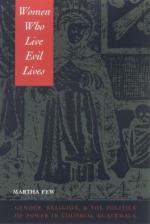|
This section contains 7,854 words (approx. 27 pages at 300 words per page) |

|
Christianity has always been a gendered tradition—as indeed have most religions—insofar as sexual difference has formed an organizing focus for its doctrines, practices, and institutions. This has been more evident in Catholic and Orthodox forms of Christianity than in Protestantism, but the gendered hierarchies that have prevailed in Christian institutions from the time of Saint Paul persisted largely unchallenged until the middle of the twentieth century. Since then churches have faced a widespread intellectual challenge to their understanding of gender, arising partly out of the influence of feminism but primarily generated by a significant number of women becoming academic theologians and biblical scholars for the first time in history. Rosemary Radford Ruether's pioneering work of feminist theology, Sexism and God-Talk, first published in 1983, asks, "Can a male savior save women?" (Ruether, 1993, p. 116).
As a growing number of feminist theologians and, more recently...
|
This section contains 7,854 words (approx. 27 pages at 300 words per page) |

|




